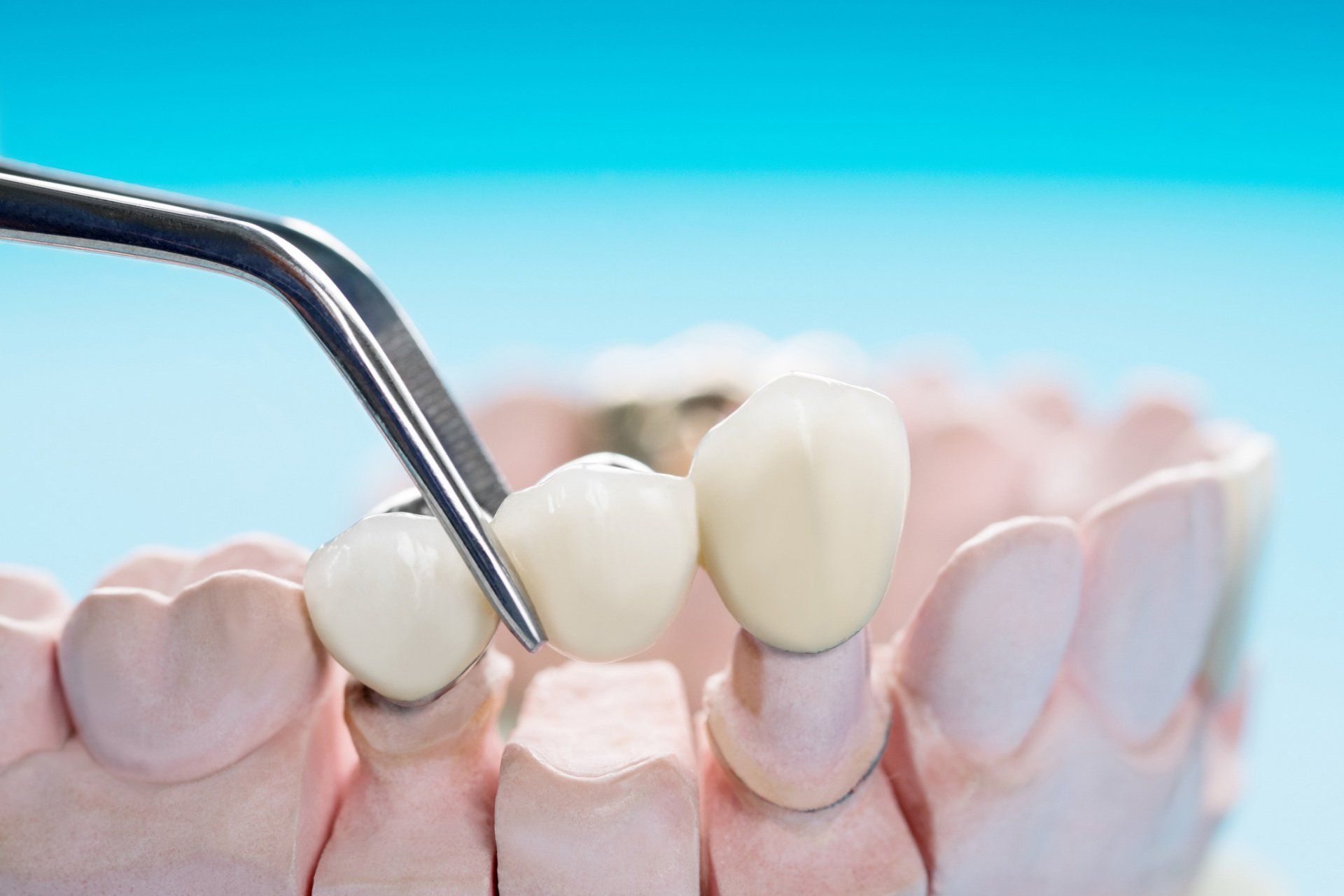Dental Bridges Right for Your Smile
Dental bridges literally bridge the gap created by one or more missing teeth.
A bridge is made up of two crowns for the teeth on either side of the gap – these two anchoring teeth are called abutment teeth – and a false tooth/teeth in between. These false teeth are called pontics and can be made from gold, alloys, porcelain, or a combination of these materials. Dental bridges are supported by natural teeth or implants.
What Are the Benefits of Dental Bridges?
Bridges can:
- Restore your smile
- Restore your ability to properly chew and speak
- Maintain the shape of your face
- Distribute the forces in your bite properly by replacing missing teeth
- Prevent remaining teeth from drifting out of position
What Types of Dental Bridges Are Available?
There are three main types of dental bridges:
- Traditional bridges involve creating a crown for the tooth or implant on either side of the missing tooth, with a pontic in between. Traditional bridges are the most common type of bridge and are made of either porcelain fused to metal or ceramics.
- Cantilever bridges are used when there are adjacent teeth on only one side of the missing tooth or teeth.
- Maryland bonded bridges (also called a resin-bonded bridge or a Maryland bridge) are made of plastic teeth and gums supported by a metal framework. Metal wings on each side of the bridge are bonded to your existing teeth.
What Is the Process for Getting a Dental Bridge?
During the first visit for getting a dental bridge, the abutment teeth are prepared. Preparation involves recontouring these teeth by removing a portion of enamel to allow room for a crown to be placed over them. Next, impressions of your teeth are made, which serve as a model from which the bridge, pontic, and crowns will be made by a dental laboratory. Your dentist will make a temporary bridge for you to wear to protect the exposed teeth and gums while your bridge is being made.
During the second visit, your temporary bridge will be removed and the new permanent bridge will be checked and adjusted, as necessary, to achieve a proper fit. Multiple visits may be required to check the fit of the metal framework and bite. This is dependent on each individual's case. If the dental bridge is a fixed (permanent) bridge, your dentist may temporarily cement it in place for a couple of weeks to make sure it is fitting properly. After a couple weeks, the bridge is permanently cemented into place.
How Much Do Dental Bridges Cost?
The cost of dental bridges varies depending on the type of bridge selected and the area of the country in which the procedure is performed. Dental insurance will typically pay a percentage of the fee depending on the individual dental plan.
How Long Do Dental Bridges Last?
Dental bridges can last 5 to 15 years and even longer. With good oral hygiene and regular checkups, it is not unusual for the life span of a fixed bridge to be over 10 years.
Will It Be Difficult to Eat With a Dental Bridge?
Replacing missing teeth with a dental bridge should actually make eating easier. Until you become accustomed to the bridge, eat soft foods that have been cut into small pieces.
Will the Dental Bridge Change How I Speak?
It can be difficult to speak clearly when teeth are missing in the front or anterior areas. Wearing a dental bridge with the anterior teeth in their proper relationship will help you speak properly.
How Do I Care for a Bridge?
It is important to keep your remaining teeth healthy and strong as the success of the bridge (depending on the type selected) depends on the solid foundation offered by the surrounding teeth. Brushing twice a day and flossing daily helps prevent tooth decay and gum disease that can lead to tooth loss. Your dentist or dental hygienist can demonstrate how to properly brush and floss your teeth. Keeping a regular cleaning schedule will help diagnose problems at an early stage when treatment has a better prognosis. Selecting a balanced diet for proper nutrition is also important.
Reviews from real patients:
Great kind understanding dentist and staff! Nothing but good vibes and experience! Just had sedation dental procedure all went well. All employees are helpful and kind! Highly recommend this place.
Susan Cobiseno
OUR LOCATION
Address: 6502B Steubenville Pike Pittsburgh, PA 15205






